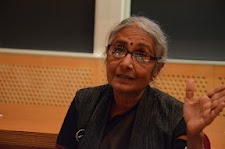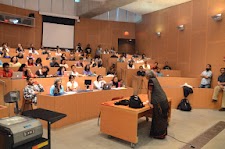Contribute
| Noted Social Activist Aruna Roy Delivers Lecture At MIT |
Press Release
05/07/2012
On Sunday April 15, acclaimed social activist and pioneer of the Right to Information Act in India, Aruna Roy delivered a lecture titled 'Transparency and Accountability in Governance' at the Massachusetts Institute of Technology (MIT). Roy serves on the National Advisory Council of India and has spent almost four decades working in rural India as part of the Mazdoor Kisan Shakti Sangathan (“MKSS - The Workers and Farmers Solidarity Organizationâ€). She was recently voted among TIME magazine's 100 Most Influential People in the World. Approximately 100 people attended.
Roy captivated the packed audience with an in depth discussion of the myriad current challenges facing India. In particular, she drew attention to the fact that much of the systemic corruption plaguing the nation stems from the culture of secrecy and unaccountability pervasive in all levels of government. Drawing from her personal experiences working among the poor, she described how this endemic corruption often hit those on the bottom of the social ladder the hardest.
It is in this context that the growing momentum of right to information movement has the capacity to empower those who have been traditionally marginalized, according to Roy. Giving numerous examples of ordinary people demanding accountability from government through access to information, Roy pointed out that the RTI tool has not only helped people in the village level gain their government entitlements but has also helped unearth some of the biggest scams in recent Indian history.
Aruna Roy stressed that the fundamental attitude of citizenry should be to ensure that the government and its institutions are functioning according to their democratic mandate. Discussing the growing voices in India to dismiss government-run institutions like schools and hospitals as inherently corrupt or incapable of efficient function, she warned that these arguments are often made by vested interests whose primary goal is privatization of public institutions.
Citing the example of healthcare, Roy pointed out that since privatization, the cost of drugs has quadrupled and in some cases increased ten-fold, out of reach of the very poor. In such an instance, a tuberculosis diagnosis is certain to be fatal because of the inability of the poor to buy drugs. Privatization of crucial areas like education and healthcare not only ensures no accountability or responsibility to social needs but also a complete lack of transparency.
Roy argued that instead of undercutting public institutions through privatization or public-private partnerships we should rather seek to strengthen them by encouraging a culture of transparency and free access to information which in turn promotes accountability. Thus, the Right to Information Act is a vital tool in strengthening the democratic fabric of our country and in making public institutions accountable to citizenry.
Former Principal Secretary of Health, Government of India, Sujatha Rao who is currently teaching at Harvard was also in attendance and joined this discussion. Rao pointed out that there is growing evidence that introduction of micro-finance schemes by private players has wreaked havoc in the lives of poor women leading to numerous suicides. Instead she suggested examining less profit-centric models such as women's collectives to ensure that public well- being is not sacrificed for private gain.
The Q&A session saw enthusiastic participation from the audience with questions ranging from how the diaspora can be involved in social movements in India to how the Right to Information model applies to countries in Africa.
The event was organized by the Association for India's Development (AID) MIT and Boston Chapters and the Alliance for a Secular and Democratic South Asia (Alliance). AID is a volunteer movement promoting sustainable, equitable and just development supporting grassroots organizations in India in various interconnected spheres such as education, livelihoods, natural resources including land, water and energy, agriculture, health, women's empowerment and social justice. They meet every Sunday at Harvard to plan and discuss how to support these grassroots projects (www.aidboston.org). Alliance is a local progressive organization which offers an open platform to community members for participation in creative solutions to the challenges facing South Asia. (www.southasiaalliance.org)
You may also access this article through our web-site http://www.lokvani.com/

